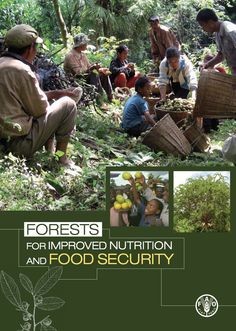ECOSOC at 80: Renewing Multilateralism in an Age of Global Uncertainty
On 23 January, the United Nations Economic and Social Council (ECOSOC) convened a commemorative session…
 Forests cover 30.6% of the Earth’s land area (nearly 4 billion hectares) and are essential to human well-being and sustainable development. An estimated 1.6 billion people – 25% of the global population – depend on forests for subsistence, livelihood, employment and income generation.
Forests cover 30.6% of the Earth’s land area (nearly 4 billion hectares) and are essential to human well-being and sustainable development. An estimated 1.6 billion people – 25% of the global population – depend on forests for subsistence, livelihood, employment and income generation.
However, the role that forestry plays in food security and human nutrition remains under-researched, and under-appreciated by policymakers. Very often, in the context of halting deforestation, we hear “protect forests, do agriculture better” – but where is the role for forestry itself? Despite the crucial contribution of forests to Food Security and Nutrition, deforestation and forest degradation continue in many regions of the world. Greater policy focus on sustainable forestry will help strengthen food security and promote nutritionally adequate diets.
I wish to congratulate the United Nations Committee on Food Security (CFS) on having selected forestry as a key issue to work on as promoting sustainable forest management as essential to delivering the 2030 Agenda for Sustainable Development.
Last week, I participated in the debated conclusion of CFS policy recommendations for all forest stakeholders that will – when implemented – have a significant and positive impact on the forestry sector and forest-dependent communities.
In my view, some of the key highlights from the policy recommendations were;
First, investing in forestry research should be a global priority. Establishing and promoting best practices with regards to forestry and agroforestry will depend upon the availability of a solid knowledge base.
Secondly, It is also fundamental that science-based technical support, extension services, integrated forestry sustainability programs are available to those working in this sector, particularly smallholders and forest-dependent communities.
We need leadership on governance to ensure that the policy recommendation get implemented and advances reach those who need it the most.
To conclude, I strongly urge member states to explore, and implement all available solutions for enhancing forest cover, and the private sector, with its experience, technology and knowledge stand ready to assist.
The policy recommendation can be found here.